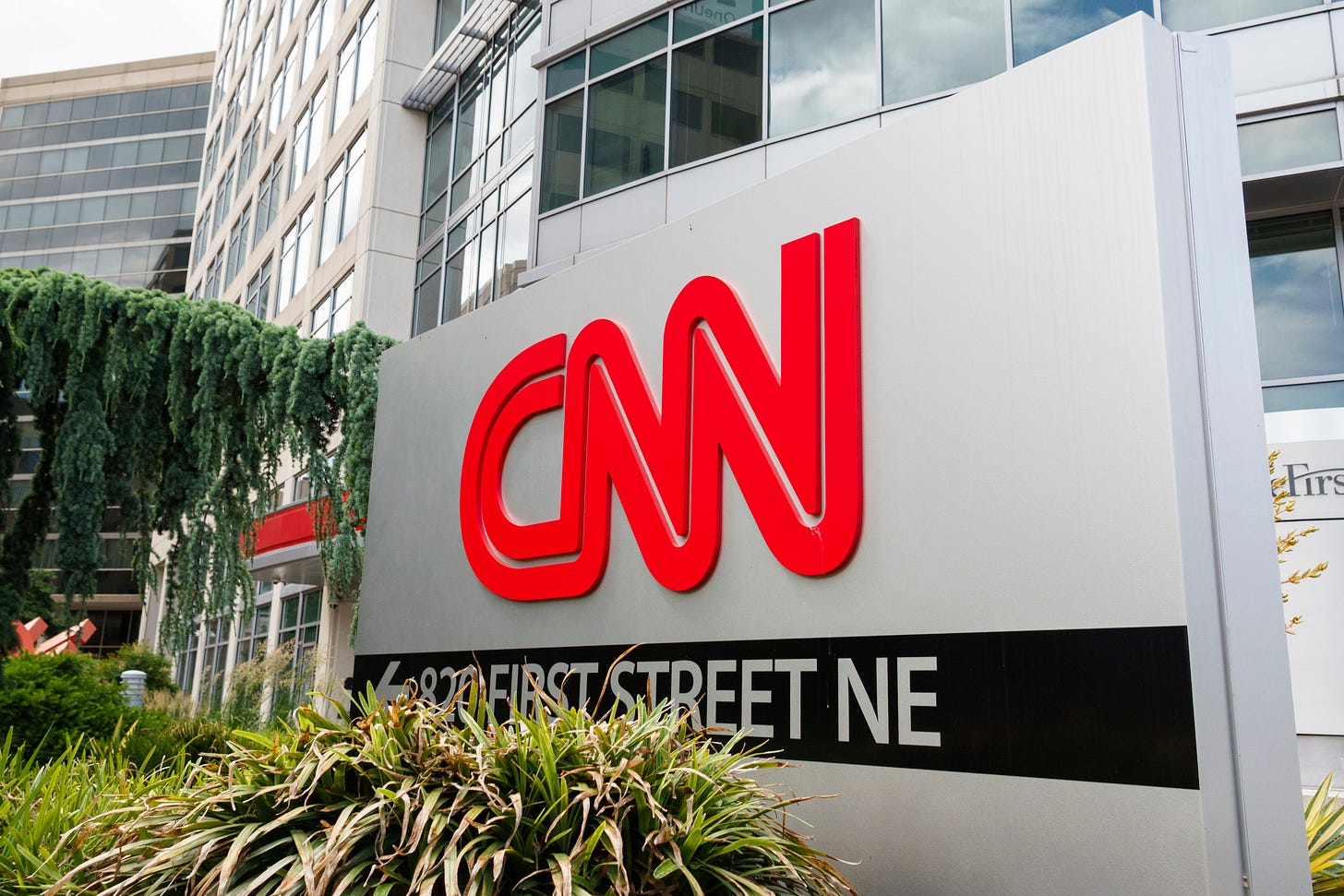CNN shows that when media orgs fight Trump, they win
Take this grift and shove it.
PN is supported by paid subscribers. Become one ⬇️
Tuesday was a busy day for Donald Trump at the 11th Circuit Court of Appeals. At the very moment he was arguing to revive a RICO trollsuit against Hillary Clinton, his effort to revive a defamation trollsuit against CNN got unceremoniously kicked to the curb.
It’s just another day in the life of the world’s most vexatious litigant. It’s also a potent reminder that, when media outlets stand up to the president’s shakedown lawsuits, they always win.
Trollsuits for fun and profit
Donald Trump spent much of his time out of office pursuing garbage lawsuits. He sued Twitter, YouTube, and Facebook for tortious deplatforming. He sued the Washington Post and New York Times over stories about the Mueller Report. He sued Simon & Schuster for publishing recordings made by Bob Woodward for his book “Rage.” He sued the Pulitzer Prize Board for refusing to retract prizes awarded in 2018. He sued New York Attorney General Letitia James twice. He sued Clinton, Jim Comey, Robert Mueller, Rod Rosenstein, the DNC, and half of DC for doing THE RICO to him. And he sued CNN for using the phrase “Big Lie,” which he said was defamatory.
The Clinton suit got him and his lawyer Alina Habba sanctioned to the tune of $1 million. Judge Donald Middlebrooks fumed that “the rule of law is undermined by the toxic combination of political fundraising with legal fees paid by political action committees, reckless and factually untrue statements by lawyers at rallies and in the media, and efforts to advance a political narrative through lawsuits without factual basis or any cognizable legal theory.” We’ll find out in a few months if Trump’s lawyers managed to convince the 11th Circuit panel to overturn the trial court’s ruling — apparently it did not go well.
But Trump’s efforts to resuscitate the case against CNN are DOA.
The inchoate airing of grievances filed in 2022 was a classic SLAPP suit, or strategic lawsuit against public participation, whacking a disfavored media outlet for unflattering coverage.
“CNN has undertaken a smear campaign to malign the Plaintiff with a barrage of negative associations and innuendos, broadcasting commentary that he is like a cult leader, a Russian lackey, a dog whistler to white supremacists, and a racist,” Trump whined in his complaint. “It is the stuff of tabloids cloaked as ‘honored’ news.”
Unbelievably, he claimed to be protecting free speech, arguing that “suits like these do not throttle the First Amendment, they vindicate the First Amendment’s marketplace of ideas.”
Trump demanded half a billion dollars because the network’s commentators used the phrase “Big Lie” and likened him to Hitler, Stalin, and Mao. Among the offending interviews was one with singer Linda Ronstadt, who made “comparisons between America under the leadership of President Donald Trump and Germany under the leadership of Adolf Hitler.”
“No matter how lovely a voice she may have, Ronstadt is a singer, not a historian,” he sulked. “The interview is merely a pretext to repeat CNN’s message under the guise of real ‘reporting.’”
A real defamation suit points to specific false statements of fact. And when the plaintiff is a public figure, it lays out evidence that the defendant knew or should have known the defamatory statements were false. Trump offered up a meandering recitation of critical quotes accompanied by a demand for a nine-figure payout based on “damage to his reputation, embarrassment, pain, humiliation, and mental anguish.”
But Trump didn’t hire a defamation lawyer for this exercise. Instead he tapped Jim Trusty, the criminal lawyer from Maryland who represented him in the early phases of the stolen documents and January 6 cases. With his characteristic modesty, Trusty invited the trial judge to overturn the Supreme Court’s 1964 holding in NYT v. Sullivan that established the actual malice standard for public figures. Florida insurance lawyer Lindsey Halligan stood in as local counsel.
And the rest is … history.
Trusty noped out of Trump’s cases in mid-2023 and was replaced by Alejandro Brito, a commercial litigator from Coral Gables.
“I can assure you that over the span of 26 years of practice, while I certainly represent my clients aggressively, I have not and do not file frivolous lawsuits, or engage in unethical conduct,” Brito told Law.com.
But four weeks later, Judge Raag Singhal tossed the case for being totally defective.
“The complained of statements are opinion, not factually false statements, and therefore are not actionable,” he wrote, adding that “CNN’s use of the phrase ‘the Big Lie’ in connection with Trump’s election challenges does not give rise to a plausible inference that Trump advocates the persecution and genocide of Jews or any other group of people. No reasonable viewer could (or should) plausibly make that reference.”
Singhal, a Trump appointee, tut-tutted that the Sullivan standard was unsuited to an era when the average viewer “no longer takes the time to research and verify reporting that often is not, in fact, news.” But a trial court cannot overturn Supreme Court precedent — not even for the former president who appointed him, because that is not a thing!
Judge Singhal dismissed the case with prejudice, meaning that Trump was not allowed to amend the complaint and take another crack at it. The court noted that trial judges are not obligated to give plaintiffs who are represented by counsel a mulligan when they haven’t asked for one in timely fashion, which Trump did not. Realizing too late that he’d bollixed the pleading, Brito moved for reconsideration.
Nope: “Plaintiff never moved to amend prior to dismissal. Plaintiff seeks the proverbial ‘second bite of the apple’ and this the Court cannot grant.”
Brito appealed, arguing that the trial judge abused his discretion. But the three-judge panel, which included two Trump appointees, disagreed, calling the appeal “meritless.”
“Trump has not adequately alleged the falsity of CNN’s statements. Therefore, he has failed to state a defamation claim,” they wrote, pointedly refusing to use the “President” honorific throughout the opinion.
SLAPPdown
Faced with a nonsensical SLAPP suit, the courts — including multiple Trump appointees! — did exactly what they were supposed to do. As they did in the Simon & Schuster case. And the Washington Post case. And the New York Times case. And the Tish James cases. And the Clinton RICO case. The Pulitzer Prize case, which is being kept alive by a state judge in Florida, is the rare exception.
The media outlets and tech platforms that settled with Trump chose to give him money because they wanted to. They could have fought and won, since Trump’s lawsuits (and his lawyering) are universally terrible. CBS, X.com, Google, and Meta decided to bribe the president instead, encouraging his campaign of extortion and contributing to the erosion of democracy.
If there’s a bright spot it’s that media outlets have finally realized that paying Trump off carries its own risks. Rupert Murdoch told Trump to pound sand when he sued the Wall Street Journal over reporting on the Epstein birthday book. The New York Times and Penguin Random House looks ready to fight off Trump’s latest trollsuit over reporting on his business and family finances. Brito’s complaint in that case was so hilariously defective that the judge himself dismissed it and ordered him to refile something less disgraceful. And the BBC declined Brito’s offer to hand over a mountain of cash for supposed journalism crimes.
Meanwhile, ABC, which give Trump’s presidential library $16 million after George Stephanopoulos called Trump an adjudicated rapist — he’s actually an adjudicated sexual abuser — is finding itself back in the crosshairs.
When Disney bowed to public pressure in September and put Jimmy Kimmel back on air, Trump screeched that the late-night host “puts the Network in jeopardy by playing 99% positive Democrat GARBAGE” which is “a major Illegal Campaign Contribution.”
“Last time I went after them, they gave me $16 Million Dollars,” he menaced. “This one sounds even more lucrative.”
Just yesterday in the Oval Office he threatened to take away the network’s (nonexistent) broadcast license.
Paying the blackmailer makes you look like a cowardly mark — both to your audience and to the guy grabbing you by the wallet. And with courts announcing that they won’t be part of the president’s extortion racket, media outlets need to toughen up and quit paying the vig.
That’s it for today
We’ll be back with more tomorrow. If you appreciate today’s PN, please do your part to keep us free by signing up for a paid subscription.
Thanks for reading, and for your support.








Good news has been relatively rare of late. This was a much appreciated exception. If only the Supreme Court Justices were as honourable as their fellow stack of Trump appointees in the lower courts.
Thank you, Liz, for including all the links. I have a lot of catching up to do. What a brilliant legal bullseye your work provides.